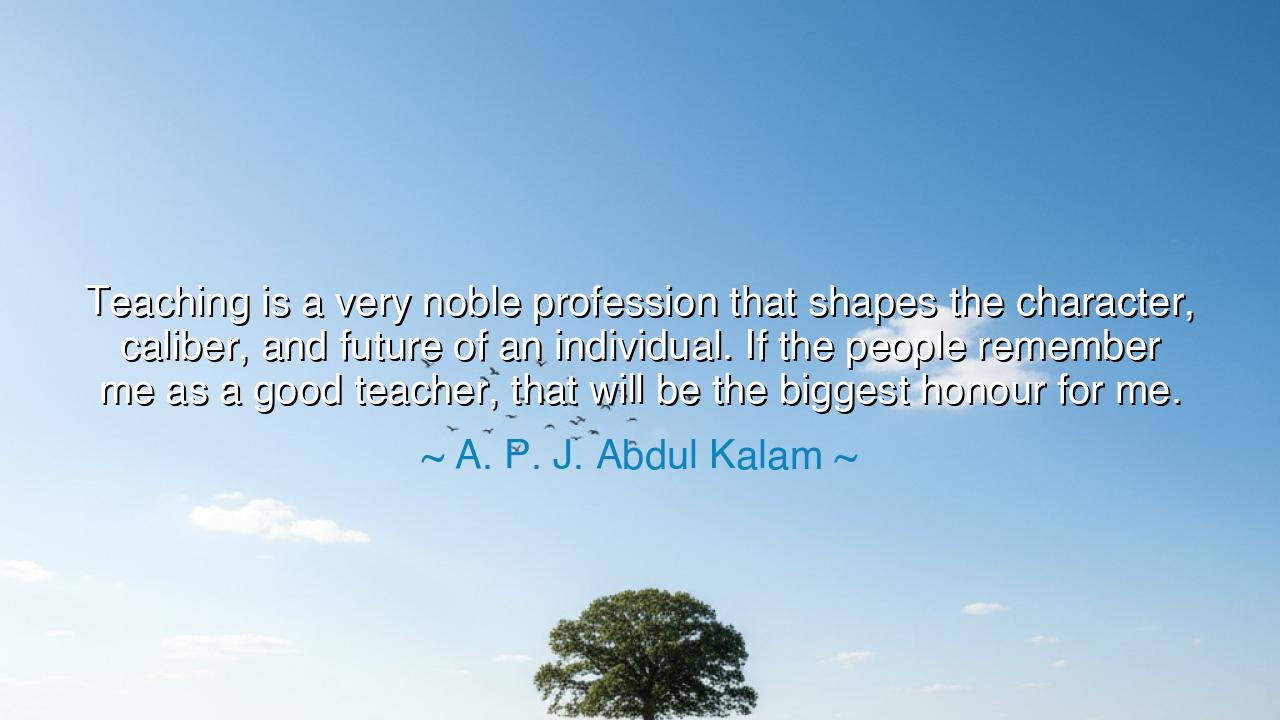
Teaching is a very noble profession that shapes the character
Teaching is a very noble profession that shapes the character, caliber, and future of an individual. If the people remember me as a good teacher, that will be the biggest honour for me.






In the words of A. P. J. Abdul Kalam, "Teaching is a very noble profession that shapes the character, caliber, and future of an individual. If the people remember me as a good teacher, that will be the biggest honor for me," we are reminded of the sacred and transformative power of education. Kalam, a man revered not only for his contributions to science and technology but also for his role as an educator, highlights the deep responsibility that teachers hold. To teach is not simply to impart knowledge, but to shape lives, to mold the very essence of an individual's future. It is a noble calling, one that extends far beyond the walls of a classroom and echoes through the generations that follow.
This sentiment of teaching as a sacred duty is as old as human civilization itself. The ancient Greeks held education in the highest regard, seeing the teacher as a figure of profound influence. Plato, in his dialogues, portrayed the philosopher as a guide to wisdom and virtue. Socrates, his mentor, famously said, "The unexamined life is not worth living," highlighting the teacher’s role not merely as an instructor, but as a moral guide. In their eyes, the teacher was someone who illuminated the path to truth, virtue, and wisdom, shaping the character of the individual and, in turn, the future of society.
Consider the example of Confucius, whose teachings in ancient China focused not only on knowledge, but also on character development and the cultivation of virtue. Confucius believed that the role of the teacher was to guide individuals to become better people—to embrace honesty, respect, and duty. His teachings influenced not only the people of his time, but continue to resonate with millions around the world. Confucius was not just imparting knowledge; he was shaping futures, molding the minds of future generations to become better leaders, citizens, and human beings. Like A. P. J. Abdul Kalam, Confucius understood that a good teacher is not simply remembered for the facts they teach, but for the values and character they instill in those they guide.
In a similar vein, Mahatma Gandhi valued education as a tool for both personal growth and national progress. He often spoke about the importance of educating the heart as much as the mind. For Gandhi, the ultimate goal of education was to cultivate not just intellectual caliber, but moral character—to create individuals who could not only think critically but live with integrity, compassion, and purpose. He believed that the role of the teacher was to foster these qualities in their students, teaching them not only how to read and write, but how to live with honor and humanity.
A. P. J. Abdul Kalam, too, recognized that the future of any nation lies in the minds and hearts of its students. As an educator and mentor, he saw that true leadership is shaped by the values instilled in the next generation. For Kalam, the biggest honor was not the titles or accolades he received, but the impact he made on his students—the leaders of tomorrow. He viewed teaching as a calling to guide others not just in science and technology, but in building character and shaping the moral and intellectual landscape of the future. His words remind us that the work of a teacher is not merely to impart facts, but to inspire students to rise above the ordinary and shape the future with integrity and vision.
The lesson here is profound: the noble profession of teaching is not defined by the mere transfer of knowledge, but by the values and character it instills in the hearts of its students. Whether in ancient Greece, China, or modern-day India, the teacher shapes not just the intellect, but the very soul of a society. To be remembered as a good teacher is to leave a legacy far beyond the classroom, one that resonates in the actions and decisions of those who have been shaped by your guidance. The true honor of a teacher lies in the impact they have on the world through the students they mold and the futures they help create.
In practical terms, we must recognize the immense responsibility that comes with the role of teacher—whether in the formal classroom, at home, or in any leadership position. Every moment of guidance we offer shapes the future. It is not enough to teach facts; we must also teach virtue, integrity, and wisdom. We must cultivate not just minds, but hearts—for it is the character we build in others that will guide them, and us, to a better future. Let us strive to be teachers not just in name, but in the example we set, leaving a legacy of wisdom, compassion, and moral clarity for generations to come.






AAdministratorAdministrator
Welcome, honored guests. Please leave a comment, we will respond soon